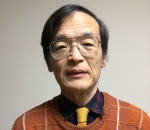・English names are “first name + last name” (like John Smith) because English culture values individualism
・Japanese names are “last name + first name” (like 田中太郎) because Japanese culture values group thinking
I believed this explanation for many years. But now I think it is wrong. I have two reasons why.
Reason 1: Language Rules (Not Culture)
Japanese and English have different grammar rules.
In Japanese, the describing word usually comes before the main word:
・二時に → 来い (at two o’clock → come)
・幸せそうに → 微笑んでいる → 女の → 子 (happily → smiling → girl)
In English, the describing word usually comes after the main word:
・Come ← at two o’clock
・A girl ← smiling ← happily
Sometimes English puts describing words before (like “a girl”), but this is not the usual way.
I think name order follows the same grammar rule:
・English: Jiro ← Imamura (first name ← family name)
・Japanese: 今村 → 二朗 (family name → first name)
This is just grammar, not culture.
Reason 2: History Shows the Wrong Order
The timeline doesn’t match.
・English people started using “first name + last name” order around 1400-1500 (14th-15th century)
・But “individualism”, as an idea, was established much later, around 1600-1700 (17th-18th century)
How can something that happened in 1400 be caused by something that was established in 1600? This doesn’t make sense.
The real reason for the name order was simple: when more people got family names, each language followed its own grammar rules.
My Conclusion
I think the different name orders in English and Japanese come from language rules, not cultural values.
Of course, once these name orders became normal, they might have helped shape how people think. English name order might support individual thinking a little. Japanese name order might support group thinking a little. But this is a small effect, not the main cause.
A Warning against over-explaining
We often try to find deep cultural reasons for simple things. Sometimes there are no deep reasons – just grammar rules or historical accidents.
Before we say “this happens because of culture,” we should check if there are simpler explanations first.
私立学校に英語教師として勤務中、40代半ばに差し掛かったころ、荒れたクラスを立て直す策として、生徒に公言して英検1級に挑戦することを思い立つ。同様の挑戦を繰り返し、退職までに英検一級(検定連合会長賞)、TOEIC満点、国連英検SA級、フランス語一級、スペイン語一級(文科大臣賞)、ドイツ語一級、放送大学大学院修士号などの成果を得る。
アメリカで生徒への対応法を学ぶ為に研修(地銀の助成金)。最新の心理学に触れた。4都県での全発表、勤務校での教員への研修を英語で行う。現在も特別選抜クラスの授業を全て英語で行っている。「どうやって単語を覚えればいいですか?」という良くある質問に答える為、印欧祖語からの派生に基づく「生徒には見せたくない語源英単語集」を執筆中。完成間近。常日頃洋書の読破で様々な思考にふれているが、そうして得た発想の一つを生かして書いた論文がコロナ対策論文として最近入賞。賞品の牛肉に舌鼓をうっている。元英検面接委員



